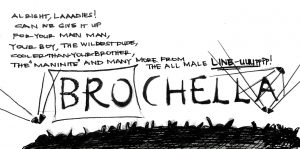COUNTERPOINT: Impromptu woman-led shows give ample exposure
This past Sunday, Bethany Cosentino of the band Best Coast took to Twitter to criticize Chris Brown. When I saw the tirade covered by Pitchfork on my Facebook news feed, I naturally assumed that she would be attacking the way that Brown has managed to maintain a relatively untarnished career despite being found guilty of violently assaulting his then-girlfriend Rihanna. Instead, Cosentino was criticizing Brown’s lyrics in his new single “Back to Sleep” for “perpetuat[ing] rape culture.” While Cosentino’s tweets insinuate that she, too, finds Brown to be an abhorrent excuse for a human being, the focus on a few lines of words over his actual violent past reflects a greater trend in how we judge the music industry.
Take the recent criticism levied against the Coachella Valley Music and Arts Festival, which I attended this past weekend. Some cultural commentators have disapproved of Coachella’s lack of female headliners, dubing the event “Brochella.” These critics focus on the numbers of Coachella’s acts, not the nuance, thus missing the point entirely. This year, for instance, the festival was headlined by LCD Soundsystem, Guns N’ Roses and Calvin Harris. LCD Soundsystem fits the standard dance-rock theme that used to characterize Coachella, and Guns N’ Roses acted as the nostalgia magnet to attract large crowds and media attention. However, most agreed that closing out the festival with Harris was an odd choice, as DJs and EDM music are staples for the smaller tents but rarely ever perform on the main stage.
Yet the rationale for Harris became obvious after Rihanna came out and stole the show, performing “We Found Love.” Many critics then asked: Why did Rihanna not just headline instead? The answer is likely a product of her highly strategic release and promotion of ANTI. It’s not that Harris is necessarily more talented than Rihanna, and it shouldn’t be seen as a comparison of their artistic narratives.
Ultimately, the argument that Coachella’s lineup makes the festival anti-feminist fails for two main reasons. The first is the culmination of multiple specific, open declarations of feminism during the festival. Most notable was Kesha’s riveting performance of “True Colors” during Zedd’s set. Coachella’s choice to showcase the singer’s talent and give her the opportunity to hold up a colossal middle finger to the judge who argued that “every rape is not a gender-motivated hate crime” was an act of actual feminism, not just words.
Then there was the pointed decision to juxtapose Canadian singer Grimes against Guns N’ Roses. Not only did Grimes hold her own against the more than three-hour set of GNR, but she also took the opportunity to endorse Bernie Sanders for president and Janelle Monáe performed with Grimes wearing the word “feminist” on her shirt.
The statistical disparity between male and female performers can be somewhat accounted for by the large number of EDM acts required to fill up the smaller tent as EDM DJs are more often men. Perhaps that number is a product of sexist oppression, but more likely it is a consequence of individual choice.
I would rave on and on about every female performance I saw, from the Lauren Mayberry-fronted CHVRCHES to Sia — and the incredible dancing and performance art of Maddie Ziegler — but realistically, I saw too many to list in this column. The fact is that Coachella 2016 was a series of compelling setups by men for women to arrive and steal the show. And looking at gender alone misses the incredible progression of the music festival entirely.
Instead of obsessing over numbers or ignoring the highly impactful demonstrations of female empowerment at Coachella, feminist activists would be better served by combating real issues such as female genital mutilation, which affects 200 million women and girls worldwide; rape, which affects an estimated 293,066 Americans 12 years of age and older annually, or even a less violent but equally pervasive issue, such as chronically low female turnout in STEM education and professions — which is the underlying cause behind the gender wage gap — because quite frankly, I am tired of this first-world, white feminism usurping productive dialogue over actual threats against women.
Tiana Lowe is a sophomore majoring in math and economics. “Point/Counterpoint” runs Tuesdays.

